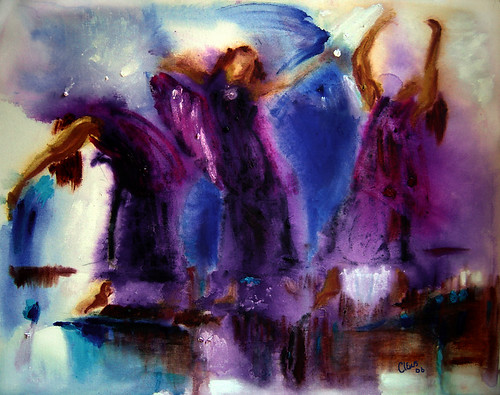
"Spirit of love, if I am to express the hospitality of God to all sorts of very different people, to people who seem very alien from me, then I need to learn to listen to each one of them very attentively. But how can I pretend to listen carefully to the different people I encounter if I refuse to listen to the different voices within my heart? What chance is there of loving and respecting others if I refuse to meet and listen to the many sides of myself? How can I be a reconciler if I shut my ears to the unreconciled conflicts within myself and pretend that I have already arrived at peace?"
-Martin L. Smith
Many of us fear the inner question of "Who am I?" because we are uncertain of what will be revealed at the end of the journey. In addition, the question sounds 'soft' and this conflicts with what we have been taught concering salvation, discipleship, and evangelism. We are a do-it-alone country living in a individualistic culture and to ask "Who am I?" admits something that is undeniable but also very peculiar; that we have another self (or even many selves).
This type of introspection is dangerous and questionable. For instance, if one day my 18 year old son begins to ask the question of "Who am I?" I will probably become concerned. My fear is that he would then skip college, set off toward the west, and grow facial hair while "just wanting to find himself." I can only hope that he has the spiritual maturity to ask the question in light of the Spirit dwelling in him. Because every person will ask this question and express it in some unique manner.
But if "all things are there" it can only be a healthy practice to ask the question and allow the Spirit to unify all of these "worlds," "selves," "microcosms;" how ever you would like to put it. You see the impossibility of reconciling all of our selves on our own!
Smith sees the self as a kind of society. I add that society needs government.
Smith writes that there are at least two selves, the asker and the recipient. I add that opposing people often need a mediator to arrive at truth.
Smith believes that there is a courageous self and a timid self. I add that, in community, a protector must make sure that one does not dominate the other.
Smith sees many selves in our past. I add that encouragers in life are needed so that we can make reconcilation, even forget, our previous mistakes.
Smith writes that there exists a diverse cast of characters within our hearts. I add that it takes a director to make everything work as it should.
-Martin L. Smith
Many of us fear the inner question of "Who am I?" because we are uncertain of what will be revealed at the end of the journey. In addition, the question sounds 'soft' and this conflicts with what we have been taught concering salvation, discipleship, and evangelism. We are a do-it-alone country living in a individualistic culture and to ask "Who am I?" admits something that is undeniable but also very peculiar; that we have another self (or even many selves).
This type of introspection is dangerous and questionable. For instance, if one day my 18 year old son begins to ask the question of "Who am I?" I will probably become concerned. My fear is that he would then skip college, set off toward the west, and grow facial hair while "just wanting to find himself." I can only hope that he has the spiritual maturity to ask the question in light of the Spirit dwelling in him. Because every person will ask this question and express it in some unique manner.
But if "all things are there" it can only be a healthy practice to ask the question and allow the Spirit to unify all of these "worlds," "selves," "microcosms;" how ever you would like to put it. You see the impossibility of reconciling all of our selves on our own!
Smith sees the self as a kind of society. I add that society needs government.
Smith writes that there are at least two selves, the asker and the recipient. I add that opposing people often need a mediator to arrive at truth.
Smith believes that there is a courageous self and a timid self. I add that, in community, a protector must make sure that one does not dominate the other.
Smith sees many selves in our past. I add that encouragers in life are needed so that we can make reconcilation, even forget, our previous mistakes.
Smith writes that there exists a diverse cast of characters within our hearts. I add that it takes a director to make everything work as it should.
"The Holy Spirit dwells in our heart and is no stranger to the diversity and conflict there." "The Spirit of God desires to bring the selves of the self into a unity around the center of the indwelling Christ." He unifies, he governs, he mediates, he protects, he encourages, and he directs.

No comments:
Post a Comment